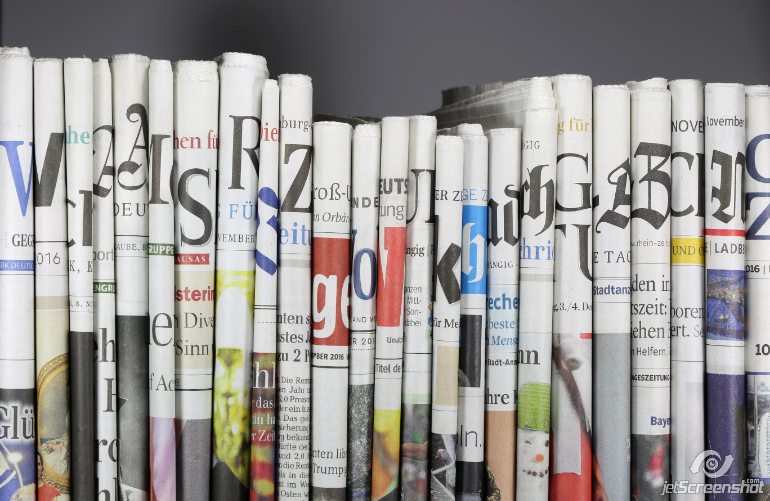Russian propagandists and agents of influence do not only operate freely in Germany, they even “set the tone” in German media. This is the view of prominent German journalist, author of the book “Putin’s Secret War” (‘Putins verdeckter Krieg’), Boris Reitschuster.
He says the Kremlin is now actively using the old intelligence network created by the Stasi in West Germany.
“Contrary to popular belief, it was never exposed after the end of the Cold War. Yes, the archives were opened, but they mainly contained information about Stasi agents in East Germany. As for agents who were citizens of West Germany, information about them was promptly removed and taken to Russia, which, by the way, Putin openly admits. We are talking about several thousand people, including politicians and generals. According to some reports, there were 20,000 Stasi informers in West Germany,” Reitschuster says.
At the same time, he says, the situation in Germany is more complicated than in the post-Soviet countries or in other Eastern European countries, some of which established special procedures to deal with former agents and KGB officers. For example, in Lithuania, after the collapse of the Soviet Union, many employees of the Soviet special services voluntarily confessed their activities to the government in exchange for a promise from the state to keep them secret. However, in Germany the situation is complicated by the fact that citizens of the Federal Republic of Germany who worked for the Stasi face a charge of high treason, which significantly complicates the possibility of making a deal with the government and opens prospects for blackmail from Moscow, says Reitschuster.
“If we take a closer look at German websites that spread disinformation and propaganda, you often find that former Stasi employees are behind them. By the way, Russia has more assets in Germany than in any other Western country. For example, the Left Party of Germany (Die Linke) is the direct heir of the Socialist Unified Party of Germany (SED), which ruled the GDR. In essence, only the name has changed. There are indirect signs that they still use SED money to this day, and their leadership ranks have for years included people who have various connections to Russia or to the USSR. There may be someone, for example, who studied at the Comintern school, while someone else’s mother came from St. Petersburg. The former leader of the Socialist Party sent a letter to Gorbachev during perestroika in which he asked him to influence the German Chancellor to keep the secret archives of the party closed. And he is still the “grey cardinal” of the Die Linke. In short, it was proven a long time ago that this party has a close relationship with Russia, and in fact it acts as ‘the long arm of Moscow’. They claim Putin’s actions are justified, speak out against Ukraine and promote the Kremlin agenda on other issues,” Reitschuster says.
Moscow has also developed new alliances in the German political establishment: for example, alliances with the right-wing fringe, he says.
“The youth wing of the right-wing party Alternative for Germany (AfD) has formally entered into an agreement with the Young Guard of United Russia. They have developed a whole program of cooperation, under which young people participate in exchange programs, and representatives of the party, including a member of the Bundestag, Markus Frohnmaier, visited occupied Crimea in 2016. One of the leaders of the party, Alexander Gauland, traveled to Russia at the invitation of a fund founded by the oligarch Konstantin Malofeev, and admits that he personally met with ‘Kremlin ideologue’ Alexander Dugin. At the same time, according to media reports, AfD co-chairman Frauke Petry met Vyacheslav Volodin, Vladimir Zhirinovsky and Peter Tolstoy in Moscow. Of course, the party backs the end of sanctions against Russia,” notes the expert.
Reitschuster says Moscow also has a strong influence on the German economy. “For example, in the city of Ingolstadt, the major Petroplus refinery went bankrupt, which, of course, could have been a big blow to local people as many jobs would have been lost. However, help came ‘unexpectedly’ from Gennady Timchenko, a billionaire with close ties to Putin. His Gunvor company bought the plant. Of course, this cannot be described as open corruption, but by coincidence, the current German interior minister, the chairman of the Christian Social Union in Bavaria, Horst Seehofer, who has long worked with Ingolstadt as the county commissioner, also positions himself as a ‘friend of Moscow’. In addition, we have large gas storage facilities that, in an emergency, can provide for the country’s needs for several months in the event of the termination of any supplies. But a controlling stake in these gas storage facilities belongs to Gazprom.”
“The gas pipeline project Nord Stream-2 is also a vivid example of Russian economic activity in Germany. Recently, a former editor-in-chief of one of the most influential German newspapers wrote an article trying to prove that Germany ‘needs’ Nord Stream. I conducted my own investigation and discovered that back in 1986, the same author wrote an article praising the GDR. Such strange ‘coincidences’ happen quite often. In addition, Russian oligarchs are actively buying real estate here”, he says.
Reitschuster says Russia’s agents of influence are strong not only in the economy and politics, but also in the information space of Germany.
“For example, German journalist Gabriele Krone-Schmalz, who worked in Moscow from 1987 to 1992, now actively promotes a pro-Russian agenda. She is a member of the steering committee of the Petersburg Dialogue Forum and defends the annexation of Crimea. Almost every television talk show includes at least two pro-Russian propagandists, including the head of the local RT office, former TASS correspondents, and so on. Even journalists who do not have connections with the Kremlin are trying to be as ‘politically correct’ as possible in relation to Russia. Speaking of the Russian invasion of Czechoslovakia, the 50th anniversary of which was marked recently, these journalists would call it the ‘Czechoslovak crisis’ and urge understanding of Brezhnev’s actions. At least, this is the tone in which the Russian-Ukrainian war is covered in Germany. Thus, the Kremlin propagandists “set the tone” for the rest of the media, and journalists like me are considered ‘warmongers’, he says.
Reitschuster says such sentiments are partly explained by Germans’ disappointment in their longtime ally, the United States, which, in his opinion, is caused by the unpredictable policies of Donald Trump. “In addition, over the past 70 years, we have not been responsible for our own external security, and this has led to a certain infantilism among our politicians. Just recently, left-wing radicals from among the so-called ‘anti-fascists’, supported by the government, made a huge inscription on the wall in Hamburg, calling to ‘save the inhabitants of Donbass from the Ukrainian army’. In general, the claim that ‘Ukraine attacked Eastern Ukraine’ is quite popular here. Many believe that Putin, albeit ‘not quite a democrat’, ideally suits the Russian people”, Reitschuster says.
“No less popular is the idea that Crimea originally belonged to Russia, moreover, it is voiced even by politicians. It amazes me that the Germans have not learned lessons from history and are so forgiving when it comes to the annexation of foreign territories,” Reitschuster concludes.
This interview was originally published here in Russian.
By Kseniya Kirillova, for Integrity Initiative





